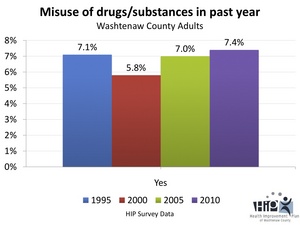Growing drug abuse problem in Ann Arbor area prompts health symposium
Prescription drug abuse is on the rise in Washtenaw County, according to data recently compiled by local health officials — and the professional community is responding.
At a symposium May 31, the Washtenaw County Health Department will release new findings, and the event will bring together several hundred people from all sides of the prescription drug issue to foster awareness and further education, said Therese Doud, substance abuse prevention coordinator for the county.

Dr. John Hopper, a specialist in addiction medicine, and Adreanne Waller, epidemiologist for the health department, will lead panel discussions in morning and evening sessions.
In Ann Arbor and Washtenaw County, substance abuse rates are frequently higher than those of the state and the nation - and residents here are less afraid of trying drugs, Waller said.
“In communities where the perception of risk for any kind of drug or alcohol is low, the rates of use will be higher,” Waller said.
At the national level, about 50,000 people die from prescription painkiller abuse every year, according to the Centers for Disease Control.
“We (Washtenaw County) reflect exactly what’s going on at the national level,” Waller said.

Courtesy of the Washtenaw County Health Department
Specific groups for whom drug abuse has increased are young adults and Ann Arbor residents, Waller said.
For the first time, the number of deaths due to drug use in Washtenaw County in 2010 exceeded the number of deaths due to motor vehicle crashes, Waller said.
“When I looked at our mortality numbers, not only did it exceed it, it did so significantly and has sustained it,” Waller said, explaining part of the reason could be attributed to improvement in safety features in vehicles and safer drivers.
A Community Focus report done by the health department found that Washtenaw and Livingston counties had the highest marijuana initiation rates in Michigan and nearly all of the U.S. from 2006 to 2008.
On average, two Washtenaw County residents are admitted to hospitals every week for prescription drug overdoses, illicit depressants, heroin and opiates, Doud said.
At the meeting next Thursday, there will be expert panelists from local law enforcement, substance abuse prevention and treatment and the faith community, as well as parents of victims and individuals recovering from substance abuse.
Waller will present local epidemiologic data that show the number of hospitalizations, deaths, substance trends, arrests and prescription trends in the county.
“This is not a one-shot-deal and then it’s done,” Doud said. “We need more caution about how we’re using medication and how we’re prescribing medication.”
The morning session from 9 a.m. to 4 p.m. -- for which registration is required -- will be geared for professionals, especially those that work in schools, law enforcement and health care.
An evening session from 6 to 9 p.m. will feature the same panel of experts, but will be open to the public and feature a question-and-answer session. Local resources will also be available.
Both events will be at the Morris Lawrence Building at Washtenaw Community College May 31.
Amy Biolchini covers Washtenaw County, health and environmental issues for AnnArbor.com. Reach her at (734) 623-2552, amybiolchini@annarbor.com or on Twitter.


Comments
BhavanaJagat
Fri, May 25, 2012 : 12:52 a.m.
HEALTH AND HEALTH SYMPOSIUM : When shall we organize a 'health symposium' to define the term 'health'? We need to know and understand what is called 'health'. To define health, we may have to define the aspects of man's well-being that contribute towards good and positive health. In the structure and functional organization of human organism, the status called good health is reflected as peace, harmony, and tranquility both within the individual and in the interactions of the individual with his environment and his community. Substance or drug abuse is associated with ill health or sickness as we find peace, harmony, and tranquility will not be seen within the person using the drugs/substances and in his/her interactions with others in his social community. If drugs are prescribed for pain relief; we may have to know the nature of both mental and physical pain. In the management of physical pain, I would expect the medical practitioner to devise methods to improve pain-tolerance and pain-resistance of individuals experiencing pain. For psychological pain, it could be important to make individuals stress-tolerant and stress-resistant.
Katrina
Thu, May 24, 2012 : 3:55 p.m.
I agree with Ron, once someone addicted to "prescription" opioids, it is a short path to heroin. I think there is a delay with these studies. Our high schools have been rife with prescription drugs for several years, and heroin use is now the growing concern. I think a study completed in a few years will show a spike in heroin addiction. I have a son right now who wants to tell me pot use "in Ann Arbor" is not a big deal; it's almost legal so it should be okay for him. Had I known that by the mere fact that he was raised in Ann Arbor would cause him to have this perspective, I have would moved somewhere else. Having grown up in Ann Arbor myself, and smoked pot as a youth, I dismissed the gateway drug theory. However, after speaking with people addicted to drugs, my thinking has since evolved. If nothing else, the act of buying pot (I won't even say "seeking it out" because that step is not necessary here) puts you in connection with people who are dealing in an illegal process. I want to put in an exception for those who use medicinal marijuana, but frankly, I think it is true even in those instances. It puts you one step close to people who will make other drugs available to you. And these connections change your perspective on what is typical drug use behavior making it seem more natural. I don't think a ban on pain killers is the answer, but a ban on the incredibly lax provision by our doctors and hospitals of such pain killers. I worked at a job that provided me with access to emergency room records and the degree at which painkillers are routinely handed out was astounding. I myself have been given oxycontin, for what was very minor pain easily handled by ibuprofen or acetaminophen. Like so many others, since I didn't need it, it sat in my medicine cabinet. Until it disappeared. So that for me would be one concrete step in the right direction - careful and discretionary use of the drugs promoted by our doctors and hospi
alex
Thu, May 24, 2012 : 6:58 a.m.
well you can't get addicted to marijuana! Meanwhile, pain pills like oxycontin AKA "legal heroin" are handed out by the white coats daily!
treetowncartel
Thu, May 24, 2012 : 4:29 a.m.
The Pharmacies, especially the ones traded on Nasdaq, are laughing all the way to the bank
Woman in Ypsilanti
Wed, May 23, 2012 : 8:42 p.m.
Clearly there are people abusing the system. I guess we should make these pain pills illegal. Let's make everything that anyone can possibly become addicted to illegal. Alcohol, Cigarettes, Marijuana, Gambling, Running Marathons, etc. j/k prohibition has already been established as not an effective solution. I would actually like to see more available treatment but otherwise I think that as a society, we are just going to have to accept that there is a cost when it comes to certain drugs. I really appreciated that these types of prescription pain killers are available when I had a bad injury not too long ago. I would hate to see people who really need these drugs denied them because some other people abuse them.
Basic Bob
Thu, May 24, 2012 : 1:12 a.m.
Yes, let's deregulate them entirely, allow unscrupulous physicians to give them out to anyone who has pain, let Medicare and Medicaid pay for it all. Put them all on disability and give them enough that they can sell them for cash and make them into self-sufficient drug dealers. Let them turn on all their friends and family members. That way is much better, meds on demand.
Mike
Wed, May 23, 2012 : 8:41 p.m.
We tolerate and in some cases advocate for certain drugs in this town. It's part of the culture of Ann Arbor and has been for years. we celebrate it at the hash bash, it's in the schools. Does it surprise anyone that if pot is so much fun why not try some of the other drugs I can find at home or on the street. Until the culture changes this will only get worse. Party on..................
alex
Thu, May 24, 2012 : 6:56 a.m.
i smoke pot and never feel the need to experience a different "high" I'd rather have my experience consist of eating a whole pizza by myself rather than being a mindless zombie on oxy. Marijuana is a gateway drug... to the fridge.
KMHall
Wed, May 23, 2012 : 11:33 p.m.
But there is a meth crisis in the (conservative) western part of the state.
xmo
Wed, May 23, 2012 : 7:36 p.m.
The drug problem would certainly explain the elected officials we have, looks like a majority voters were on drugs when they voted! How else can you explain it? Irwin, Hieftje the city council
treetowncartel
Thu, May 24, 2012 : 4:27 a.m.
Thank you Kimchee Mofo Hall for standing your ground
KMHall
Wed, May 23, 2012 : 11:31 p.m.
Would we have such comments as this if everyone were forced to use their own name?
Harry
Wed, May 23, 2012 : 7:16 p.m.
Drugs are bad MMMMMMMKKKKKK
dotdash
Wed, May 23, 2012 : 7:10 p.m.
People who used to have a few stiff martinis now take oxy. Same problem, different solution.
Ron Granger
Wed, May 23, 2012 : 6:54 p.m.
"Growing drug abuse problem in Ann Arbor area prompts health symposium" Hmm. I liked the other headline better: "Growing drug abuse problem in Ann Arbor area prompts joint conference"